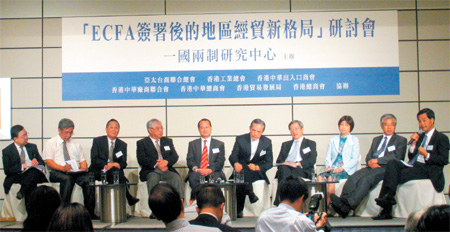ECFA 'could boost HK economy'
Updated: 2010-09-02 06:53
By Emma An(HK Edition)
|
|||||||||
|
Scholars and experts exchange their views at a seminar held in Hong Kong Wednesday on the impact of the cross-Straits Economic Cooperation Framework Agreement on regional economies. Emma An / China Daily |
External trade may suffer a little bit in the short term
The Economic Cooperation Framework Agreement (ECFA), recently signed by Taiwan and the mainland to reduce barriers to cross-straits trade, could provide a boost to the Hong Kong economy. Scholars from Taiwan, Hong Kong and the mainland made the remarks at a seminar held in Hong Kong on Wednesday.
The signing of the ECFA in June has led to some jitters and wariness not only in Taiwan - where some are worried that the agreement will mark the start of the island losing its economic independence - but also in Hong Kong. The notion that the city could give up a large slice of the re-export market and that Taiwan could be more competitive on the mainland market has unnerved some people. However, scholars at Wednesday's seminar disagreed with such views.
"The years following the signing of the FTA (ASEAN-China Free Trade Agreement) have seen a huge increase in trade between China and the region. Likewise, the agreement is followed by growth of trade between Hong Kong and the region," said Hong Kong Trade Development Council (HKTDC) chief economist Edward Leung, who suggested that the ECFA may turn out to be a blessing for the Hong Kong economy.
However, Leung cautioned that the ECFA may have some negative effects on Hong Kong's external trade in the short term given the role the city has long played in cross-Straits trade.
Hong Kong's re-exports involving Taiwan and the mainland from January-April 2010 totaled HK$ 66.6 billion, or 20 percent of the mainland's exports to Taiwan.
Meanwhile, Wang Guiguo, dean and chair professor of Chinese and comparative law at the City University of Hong Kong, suggested that the ECFA will benefit Hong Kong if the city can make the most out of its strengths and consolidate them. "We do have our comparative advantages such as in the aviation and financial industries. With the ECFA in place, what we should do is to enhance these comparative advantages," said Wang. He added that the ECFA, which has the primary role of making trade across the Taiwan Straits easier, shouldn't be much of a concern for Hong Kong, which bases its economic existence on the service industry rather than foreign trade.
Wang's thoughts were echoed by Feng Xiaoyun, a professor of economics at Ji Nan University. "The ECFA will open a new chapter for economic cooperation between the mainland, Taiwan, Hong Kong and Macao by facilitating the restructuring of resource allocation and urging everyone to find its own niche," she said.
Feng said that the past 30 years have witnessed the rapid spread of a "made-in-China" phenomenon, with most of the products sold on the global market being a result of cooperation between the mainland, Hong Kong and Taiwan. "The past 30 years have seen how an order could be made in Hong Kong, yet with the research and development conducted in Taiwan, and manufacturing done on the mainland. The coming 30 years probably will see this cooperation become closer and stronger."
China Daily
(HK Edition 09/02/2010 page3)
